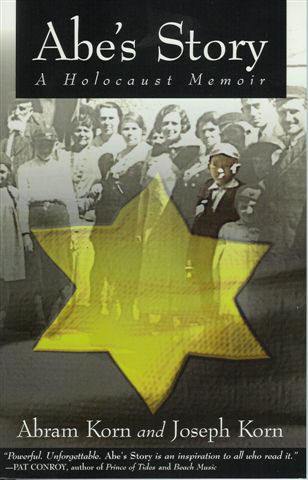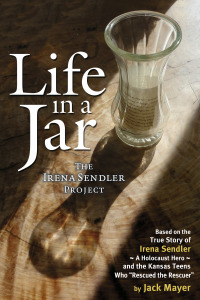(Yellow Moon Press)
ISBN 0-938756-34-6.Robert was eleven when the Germans invaded his village of Wlodziemierz in the Ukraine. This story is from “Rachel’s Wedding.” Without warning on June 22, 1941, Germany artillery shells shot across the Bug River and scored direct hits on the homes of my four uncles. . . . the landscape was a nightmare of torsos, hands, heads, arms, legs and fists. There was no time to bury the fragments. The Germans ordered all Jews to assemble in the townsquare. . . . The peasants helped us [Robert, his mother, his father and his five year old sister] to escape that evening from our barbed-wire enclosure. We fled thirteen miles to the Bug River, where we crossed into the Russian zone. We existed on unripened corn, berries and mushrooms. But, as the first frost fell, my father took me aside. “Robert, we must make a pact. If times get too bad, I shall kill Mother, and you are to kill Rachel. Then we’ll kill each other. I know it is hard for you to understand, but there are things worse than death.” Rachel had followed us. She started to cry. “You are not to do that. One day you will dance at my wedding. If we’re going to die, let the Germans do it.” When the weather grew colder, the peasants hid mother and Rachel. Father and I remained in the woods sleeping in caves. One day, . . . . a group of bounty hunters captured us and turned us over to the Germans. My father and I were separated and put into concentration camps. Like ants, the other prisoners and I carried bags of grain on our backs up a steep, slanted plank to a grain bin. The sack in front of me had a hole. . . I slipped. Pains shot through my ankle, but I got up. . . . at nightfall, I could scarcely limp back to the barracks. A doctor in my work group examined me. My ankle was broken. . . . “How can we hide him?” My tired and starving work group began to dig a hole. I climbed into the pit, wondering if I would come out alive. At night, the lid was kept open. At each roll call, someone answered to my name. The entire barracks had taken a terrible risk. When I recovered, I found we had a new work detail: digging holes. Deep, deep pits, four of them large enough to execute and bury twenty-five hundred people at one time. . . . I had to escape. I backed away. Let a bullet kill me. . . I waited until the beams from the revolving searchlight were on the other side of the camp and slipped through the gate. In the forest, I joined a band of Russian partisans. . . . | ![]()
![]()




